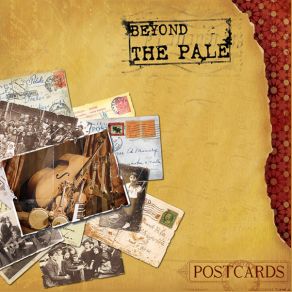Postcards
Download links and information about Postcards by Beyond The Pale. This album was released in 2009 and it belongs to World Music, Songwriter/Lyricist, Celtic genres. It contains 16 tracks with total duration of 56:28 minutes.

|
|
|---|---|
| Artist: | Beyond The Pale |
| Release date: | 2009 |
| Genre: | World Music, Songwriter/Lyricist, Celtic |
| Tracks: | 16 |
| Duration: | 56:28 |
| Buy it NOW at: | |
| Buy on iTunes $9.99 | |
Tracks
[Edit]| No. | Title | Length |
|---|---|---|
| 1. | Magura | 2:53 |
| 2. | Solution | 2:17 |
| 3. | Katarina | 4:16 |
| 4. | Kamenetzer | 4:27 |
| 5. | Gg's Anthem | 4:05 |
| 6. | Shtern | 5:10 |
| 7. | Turkish Delight | 2:23 |
| 8. | Back To The Beginning | 3:44 |
| 9. | Meditation | 4:29 |
| 10. | Split Decision | 5:13 |
| 11. | Postscript | 2:00 |
| 12. | An Old Legend | 2:42 |
| 13. | Are Two | 3:19 |
| 14. | Dutchmandu | 3:15 |
| 15. | Doina | 3:55 |
| 16. | Extra Spicy | 2:20 |
Details
[Edit]Groups that are difficult to categorize — not necessarily impossible to categorize, but difficult to categorize — can be challenging for marketing departments to promote, although they are certainly a lot of fun if the listener is broad-minded. Beyond the Pale is such a group. Half the fun of listening to the largely (but not exclusively) instrumental Postcards, in fact, is trying to figure out exactly where this Toronto-based combo fits in stylistically. Postcards is acoustic-oriented world music — that much is undeniable — but exactly what area of world music are we talking about? Beyond the Pale have an East European orientation, and parts of this 2009 release are relevant to Jewish klezmer music. The Jewish influence on Postcards is quite strong, but the gypsy music of Romania, Bulgaria, Hungary, and other East European countries is a heavy influence as well. And some of Beyond the Pale's influences come from outside of Eastern Europe; Eric Stein's mandolin playing sometimes suggests Italian folk, and there are hints of both Italian folk and French chanson in some of Milos Popovic's accordion playing. On top of that, there are some Middle Eastern influences on Postcards — which makes perfect sense when one considers that Middle Eastern music and a lot of East European music involve what is known as "modal" or "scalar" playing. But as far-reaching and unpredictable as Postcards is, the album is also pleasingly consistent. There have been plenty of experimental world fusion albums that had the best of intentions but unfortunately, missed the mark and ended up being uneven and erratic. However, that isn't a problem at all on Postcards, which is as focused as it is risk-taking.